
Justifications, initial declarations (IDs), popular acclamation and the silence of regional bodies and neighbours made the coup in Zimbabwe appear to protect democracy. However, when the coup is reconciled with historic civil-military relations in Zimbabwe and the events immediately preceding the coup, what emerges is military action in Zimbabwe in 2017 that further weakened the country’s already frail democracy.
In the light of the backdrop to the coup, the events that have unfolded in Zimbabwe between November 2017 and January 2018 have revealed a coup that has imposed a One-Party mentality, consecrated the power of a military-civilian “Corporation of Power” and of barracks democracy, placed private interests over general good and deprived an already deprived electorate of its right to choose its own President.
Furthermore, the alleged militarisation of the government and the ruling ZANU-PF party has raised questions on whether it is the civilians or military in control and whether ZANU-PF will be willing to cede power if it loses the ensuing harmonised elections scheduled for 30 July 2018.
Full analysis here.
Leave a Reply